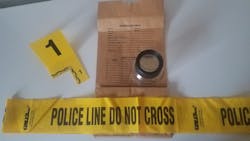Eye for Evidence-The Importance of Fingerprints Part I
Fingerprints are one of the most important pieces of evidence you will ever find. There is no question that a print belongs to a particular individual, especially if there are enough characteristics to confirm a match.
Comparing and identifying latent fingerprints are not only one of my strong points but it is a forensic discipline I am passionate about. The entire process recording, comparing, and identifying latent fingerprints is fascinating and each step is so important.
As you know, when you book a prisoner, you must take their fingerprints. Though some departments still use ink, for most, a custom computer with a scanner is used. From there, those prints are usually found somewhere with the booking sheet and then are sent to a state crime lab to keep on file. However, I had the privilege of having a fingerprint computer in my department with the ability to classifying prints, store them and compare them later if need be. I was taught by my first Sergeant how to properly classify prisoner’s prints. Though tedious, I took to it quickly and was soon able to classify, and mark ten fingers in under a minute. Many personnel in law enforcement do not like this task however it is crucial. Once each fingerprint is classified, meaning identifying what pattern it is-loop, whorl, etc.-, the prints are given a code (the Henry code). This code goes into fingerprint databases plus NCIC and helps as an identifier as well.
Later, if a latent print is found at a scene, it will be compared either manually or via software to see if it matches any of the prints on file. By having those prints on file already classified, it will can significantly narrow down the search. I have had cases where I was able to narrow down the search to one or two fingers.
Fingerprints are complex and have many purposes. Classification is only the tip of the iceberg.
About the Author

Hilary Rodela
Hilary Rodela is currently a Surveillance Officer, a former Private Investigator, a former Crime Scene Investigator, and Evidence Technician. She worked for the Ruidoso (NM) Police Department as well as the Lubbock (TX) Police Department. She has written for several public safety publications and has extensive law enforcement and forensic training and is pursuing forensic expertise in various disciplines. Hilary is a freelance public safety writer and curriculum developer for the National Investigative Training Academy.
